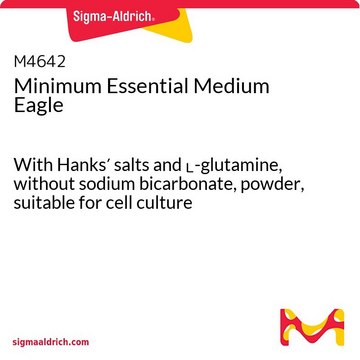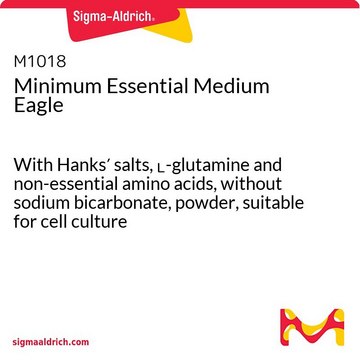M2414
Milieu essentiel minimum d′Eagle
With Earle′s salts and reduced NaHCO₃. without ʟ-glutamine, liquid, sterile-filtered, suitable for cell culture
Synonyme(s) :
MEM
About This Item
Produits recommandés
product name
Milieu essentiel minimum d′Eagle, Modified, with Earle′s salts and reduced NaHCO3. without L-glutamine, liquid, sterile-filtered, suitable for cell culture
Niveau de qualité
Stérilité
sterile-filtered
Forme
liquid
Technique(s)
cell culture | mammalian: suitable
Impuretés
endotoxin, tested
Composants
phenol red: 0.011 g/L
NaHCO3: 0.85 g/L
glucose: 1.0 g/L
L-glutamine: no
Conditions d'expédition
ambient
Température de stockage
2-8°C
Vous recherchez des produits similaires ? Visite Guide de comparaison des produits
Description générale
MEM, which incorporates these modifications, includes higher concentrations of amino acids so the medium more closely approximates the protein composition of cultured mammalian cells. MEM has been used for cultivation of a wide variety of cells grown in monolayers. Optional supplementation of non-essential amino acids to the formulations that incorporate either Hanks′ or Earle′s salts has broadened the usefulness of this medium.
Application
Autres remarques
Reconstitution
Souvent commandé avec ce produit
Code de la classe de stockage
12 - Non Combustible Liquids
Classe de danger pour l'eau (WGK)
WGK 1
Point d'éclair (°F)
Not applicable
Point d'éclair (°C)
Not applicable
Certificats d'analyse (COA)
Recherchez un Certificats d'analyse (COA) en saisissant le numéro de lot du produit. Les numéros de lot figurent sur l'étiquette du produit après les mots "Lot" ou "Batch".
Déjà en possession de ce produit ?
Retrouvez la documentation relative aux produits que vous avez récemment achetés dans la Bibliothèque de documents.
Les clients ont également consulté
Notre équipe de scientifiques dispose d'une expérience dans tous les secteurs de la recherche, notamment en sciences de la vie, science des matériaux, synthèse chimique, chromatographie, analyse et dans de nombreux autres domaines..
Contacter notre Service technique





